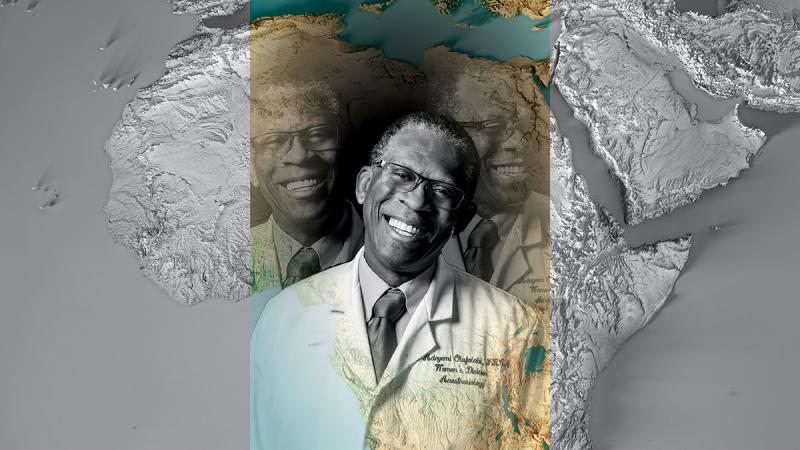
EMPOWERING HEALTH BEYOND BOUNDARIES
“Wherever the art of medicine is loved, there is also a love of humanity.”
– Hippocrates
For three months every year, Adeyemi J. Olufolabi, MBBS, excitedly puts boots on the ground in Africa as part of Duke Anesthesiology’s Global Health Program (GHP) to serve those disadvantaged by geography. The reasons he does so are compelling, personal, and rooted deeply in humanity.
“It’s humanity from the prospect of people who don’t have anything by virtue of where they were born,” Olufolabi says, adding, “we have a role to play in global health to make the world a better place. For me, as an obstetric anesthesiologist, it’s caring for a very vulnerable group, the poor yet pregnant sick mother with or without a sick baby and finding the heart and the effort of helping her navigate a complex experience towards a healthy outcome.”
Fondly called Yemi by colleagues, Olufolabi plays a pivotal role in the department’s outreach efforts in Africa as he works hard to narrow the chasm in health care created by the stark inequity in the global distribution of resources. Duke Anesthesiology’s motto - What we do changes the world - inspires Olufolabi, program director of the Anesthesia Global Health Fellowship that aims to address health disparities in low-resource countries while creating career opportunities for anesthesia residents and fellows. “That human experience is what I want others to experience because it is so enriching on a personal basis,” he emphasizes.
According to the Women’s Anesthesiology Division chief, Ashraf Habib, MBBCh, “The GHP is very important to the women’s division; it addresses maternal morbidity and mortality, something that members of the division are very passionate about. Our obstetric anesthesia fellowship program is known as being the only one to consistently offer its fellows the opportunity to spend time with Yemi in Ghana. The experience has been very rich and rewarding, allowing those participating in it to have a different perspective, more appreciation of what we have here in the US, and maybe viewing problems with a different lens.”
The hard facts about health care inequities tell a disturbing story. According to the World Health Organization (WHO), a woman dies of pregnancy-related causes every two minutes. Even as the global maternal mortality ratio (MMR), defined as the number of maternal deaths per 100,000 live births, has come down by 34% (from 339 deaths in 2000 to 223 in 2020), more than two-thirds of these occur in the African Region. In 2020, the MMR in the African Region was 531, a far cry from the WHO goal of reducing them to 70 by 2030. Seventy-five percent of all maternal deaths are due to major complications, including severe hemorrhage, infection, high blood pressure during pregnancy (pre-eclampsia and eclampsia), complications during childbirth and unsafe abortion, according to WHO data.

“My global health mission in Ghana ended up being one of the best experiences I have had in my medical training. One of my biggest clinical takeaways was that providing safe and effective anesthesia can be done with simple resources, and perhaps we sometimes overcomplicate things in our resource-rich environment.”
– Dr. Liliane Ernst, Duke Anesthesiology ’24 Fellow
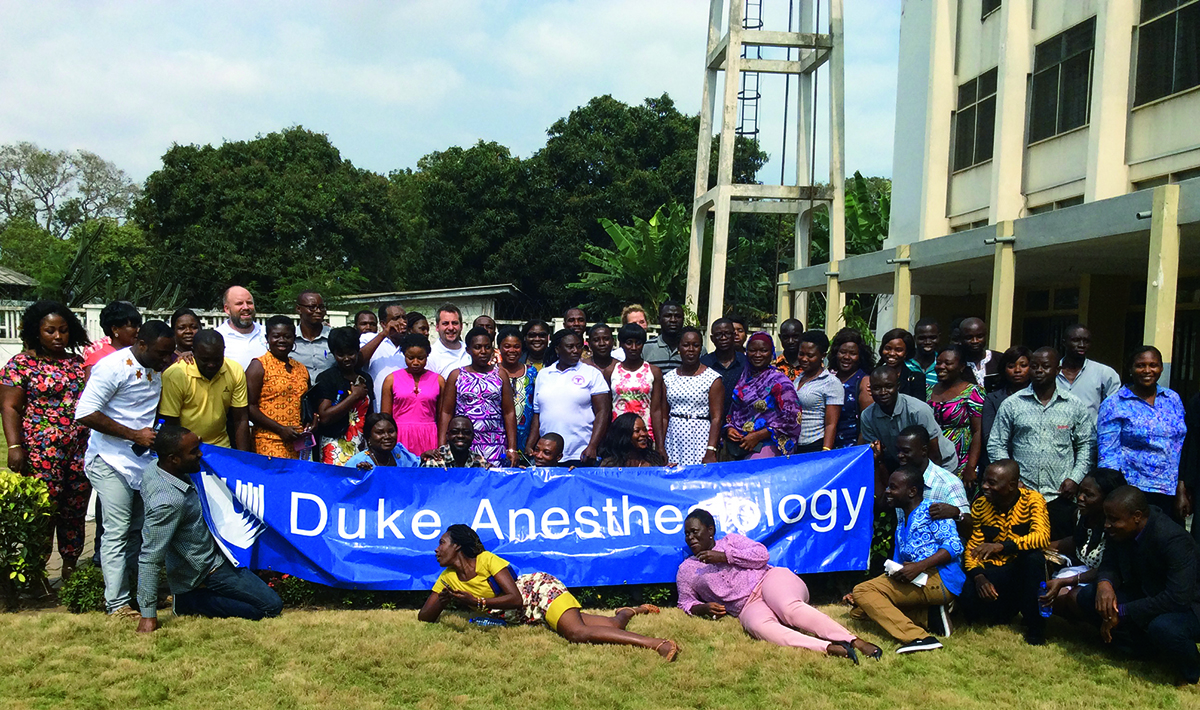
The right care at the right time, however, can prevent many deaths. And that’s what Olufolabi sees as his life’s work. He began working in Ghana in 2005 as a volunteer under the banner of Kybele, a global non-governmental organization founded in 2001 by Wake Forest School of Medicine obstetric anesthesiologist Medge D. Owen, MD. It comprises medical, nursing, and public health officials from the USA, Canada, and England, dedicated to improving the quality and safety of childbirth in low- and middle-income countries. Duke has played a big role in Kybele, and every year, Olufolabi engages up to three volunteers, including colleagues, residents, and fellows to collaborate and improve maternal health by reducing labor pain and maternal mortality and stillbirths across many health systems in some African countries.
This is also a way to reconnect with a continent that made Olufolabi a doctor. Of Nigerian descent, Olufolabi was born in England but developed a wider world perspective when his father’s job in the Nigerian Diplomatic Service took him across several continents. He went to school in Ghana, acquired his medical degree from the College of Medicine, University of Ibadan, in Nigeria and returned to England to train as an anesthesiologist. Involved from the very beginning of his career in humanitarian programs, Olufolabi joined Duke in 1999.
It is an overwhelming sense of gratitude and responsibility that propels Olufolabi to give back to the continent from which he received so much. Habib concurs, “I have seen him work tirelessly by keeping connected to his colleagues in Africa while he is back here in the US. I have also seen him hosting visitors from Africa in our institution to help them learn firsthand from our systems. To be able to travel to Africa for those extended periods of time, Yemi chose to work exclusively night shifts while he is at Duke.”
Coincidentally, this physician’s great desire to serve intersects with a greater need for trained doctors, equipment, and supplies in Africa’s resource-challenged countries. “We in America have so many resources, to the point that we waste them and throw them away. Over there, they just need a little bit more. Very little of what we have already will make life so much better for them,” informs Olufolabi, adding, “how the lack of resources not only disrupts life for the individual, but also for the community.”
Personal experiences have had a powerful impact on him. The Fulbright scholarship in 2018 took him to Rwanda for a project involving interviewing men who lost their wives during childbirth. “Just sitting in their homes and listening to them talk about what they have been through changed the way I saw life. It was a very human experience that I want others to experience.”
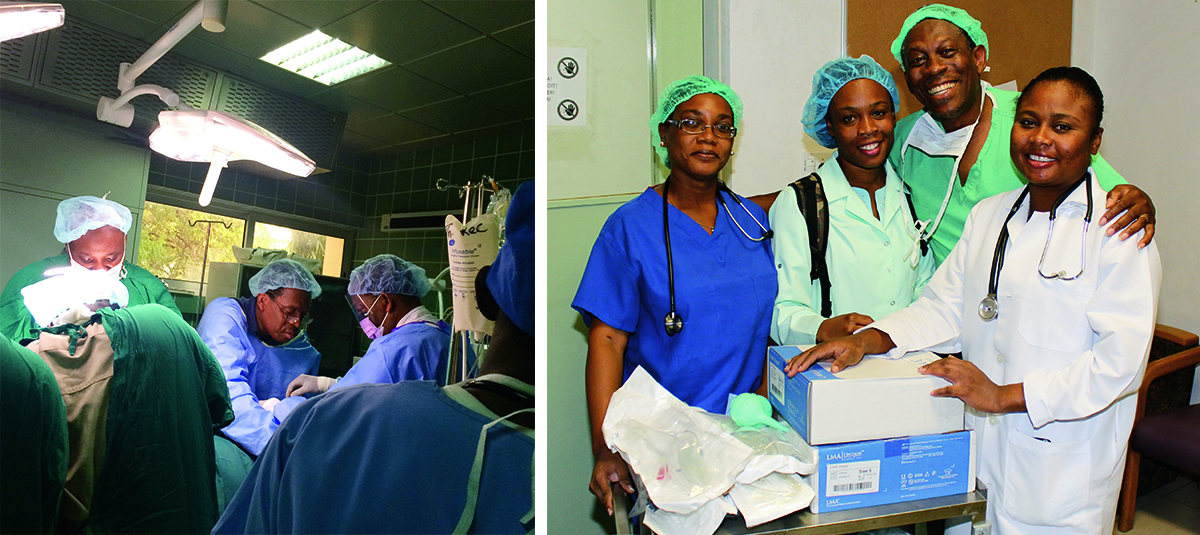
“Yemi has an innate ability to quickly connect with people and earn their trust – usually with a wide smile on his face! By listening to their needs, asking insightful questions, and focusing on what can be done today, he is uniquely able to spring global health partners toward their shared vision."
– Dr. Eric JohnBull, Duke Anesthesiology Faculty
Caring for patients in challenging environments that woefully lack basic health care is as sobering as it is enlightening. “Duke Anesthesiology is full of very bright people who are problem solvers. They can be very engaging to a group of people who can really benefit from the expertise that we have,” adds Olufolabi, always excited about carrying forward Duke’s cutting-edge program to distant lands and opening a new world of opportunities for those in the medical field. Not surprisingly, Duke anesthesiologists have been on the forefront of global health efforts in low resource countries like Guatemala, Haiti, Ghana, Uganda, Sierra Leone, Honduras, and South Africa, among others.
And behind Duke Anesthesiology’s global health efforts is its supportive leadership that is invested in the creation of leaders passionate about addressing health inequities. “That’s where our global health program fits nicely with the idea that you cannot lead without experience, you cannot lead without listening, and you cannot lead without understanding,” says Annemarie Thompson, MD, residency director and vice chair for education. She highlights how Duke Anesthesiology, through fundraising and departmental funds, offers a month-long global health experience to residents as a bona fide elective rotation, approved by ACGME and the American Board of Anesthesiology.
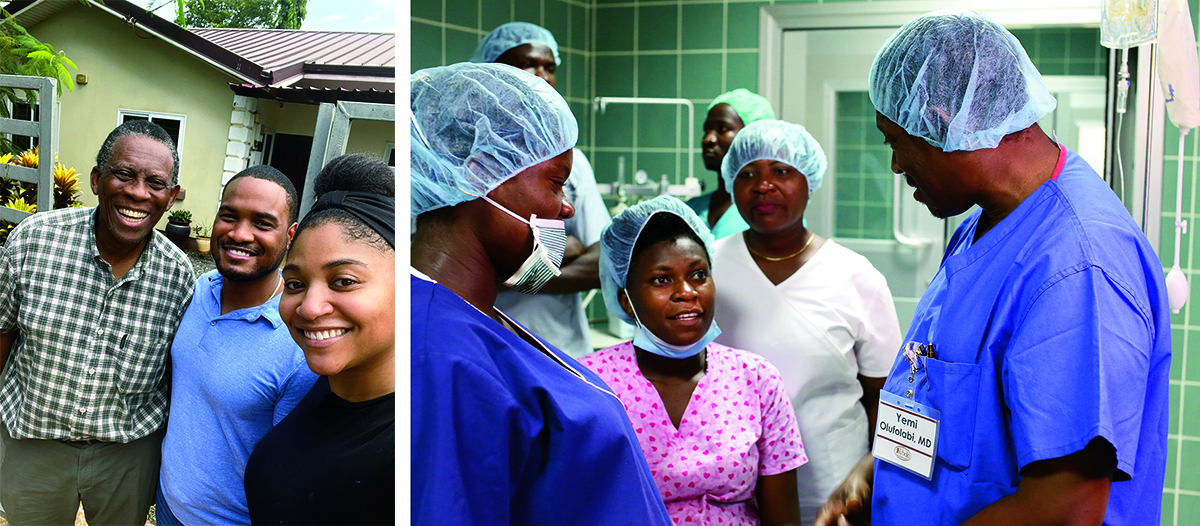
“Dr. Olufolabi has been our backbone since the School of Anaesthesia at Ridge Hospital was established in 2009, and he still plays a vital role in the running of the school today. His zeal for the work he does cannot be underestimated. A lot of mothers and babies are alive today because of his intervention.”
– Dr. Evans Atito-Narh, Director, School of Anaesthesia, Accra
For trainees, involvement in the GHP that serves low-resource regions is transformative. According to Thompson, “Duke is one of the very few residency programs that offers global health as an optional training. It started out with one or two people choosing this experience over 15 years ago to almost four to six in a senior class of 15 now.” Their feedback has been overwhelmingly positive, especially about how Olufolabi helps them navigate an uncomfortable space in a distant land and makes it into this amazing educational opportunity for residents, she adds.
“So far, 23 residents have gone on global health trips and over 20 faculty have been involved in one form or another. Few fellows have gone on several trips, including with surgical specialties like orthopedics, neurosurgery, and pediatrics,” informs Olufolabi proudly. “I have to highly applaud the efforts of Adam Flowe, chief nurse anesthetist, and Kent Smith, chief anesthesia technologist, who have brought teams and helped supply equipment to Ghana so many times,” adds Olufolabi.

“To say my Duke global health rotation was pivotal in my journey would be an understatement; it served as my first experience outside of the United States and was integral in transforming my worldview. A true pioneer, Dr. Olufolabi taught me that when you are truly passionate about something, you do not take no for an answer, and you find innovative ways to meet the challenges facing those who are in need.”
– Dr. Savion Johnson, Duke Anesthesiology Alumnus
He observes that Africa has a dearth of teachers, but an abundance of learners who thirst for information. At Duke, global health interactions are a two-way process. The program supports the sponsorship of medical personnel from Africa visiting Duke to observe workable organizational structures so that they can return home to implement quality improvement measures that work within their systems. Besides sharing of expertise, through observation in the ORs, meetings, and simulations, there is also sharing of medical equipment, informs Olufolabi. “This is the strength of Duke; we are good at training people.”
The goal, informs Olufolabi, is for people to stand independent so that local medical workers can take on local patient challenges. Statistics point to a great need. Sub-Saharan Africa has 25% of the global disease burden, but only 3% of the world’s health care workers.
That’s where innovation can help. Olufolabi highlights the success of a pilot program that leveraged WhatsApp, a mobile messaging platform, to expedite communication between hospital staff to facilitate high-risk obstetric referrals between far-flung health care facilities in the Greater Accra Region. “Global health, for me personally, is more about building capacity. You study a system and collaboratively identify holes that need to be improved. We are trying to increase the numbers who are trained,” emphasizes Olufolabi.
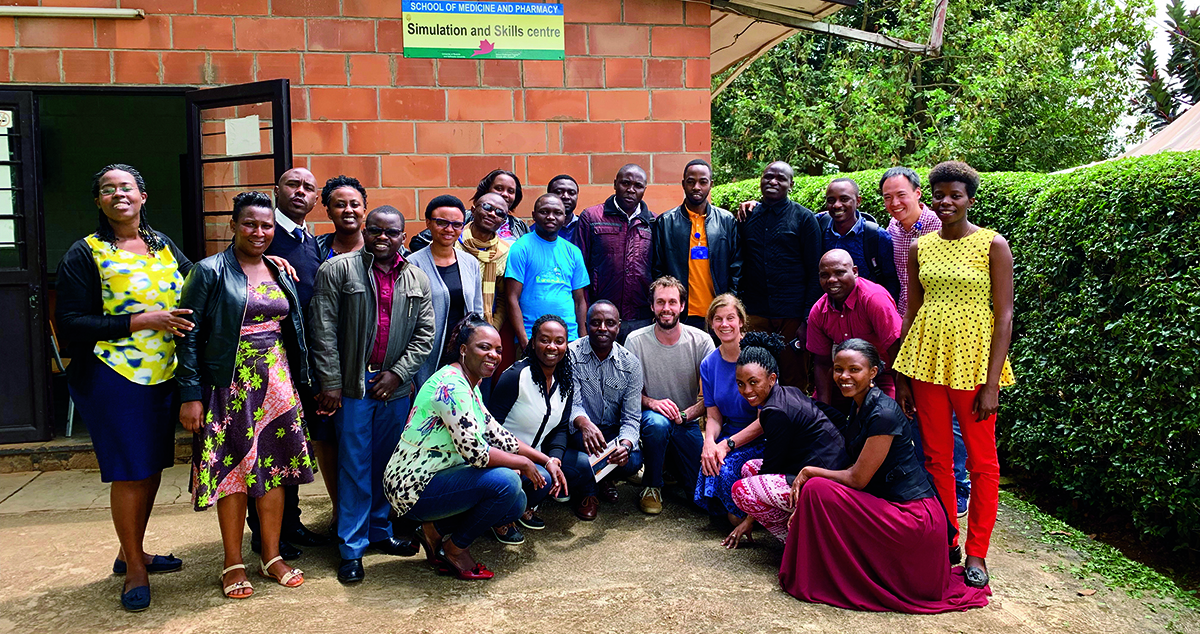
“My time in Africa with Dr. Olufolabi during my anesthesia residency has had a profound impact on my life and changed my philosophy on helping others. Help in any way is obviously valuable, but helping others learn to help themselves is how progress is able to be sustained and built upon over time. I witnessed the power of personal connection and passion for improving a system that could then go on to improve the maternal health and well-being of an entire nation… he epitomizes what it takes to affect long lasting change.”
– Dr. Kayla Bryan, Duke Anesthesiology Alumna
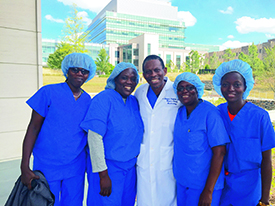
Another successful example of capacity building was the establishment of a nurse anesthesia training school in Accra, Ghana, in 2009. The humanitarian organization partnered with the Ghana Health Service (GHS) to set up an 18-month nurse anesthesia training program, a hands-on collaborative effort between local schools in Ghana and the visiting Kybele leaders from eminent US academic medical centers.
“The school has now graduated over 800 nurse anesthetists, and countries such as Sierra Leone, Malawi, and Nigeria have sent nurses to be trained here, further increasing anesthesia provider capacity in African countries,” adds Olufolabi. He is currently involved in an effort to create a maternity center of excellence in four regional hospitals with a goal to reduce neonatal mortality and stillbirths in Ghana.
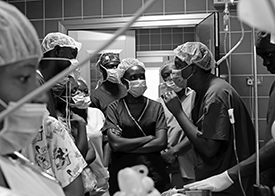
Olufolabi has also participated in the setting up of an obstetrics fellowship in Nigeria, under the aegis of the World Federation of Societies of Anesthesiologists, a global organization that helps augment the training capacity of anesthesia providers in low- and middle-income countries. The fellowship aims to increase their skillset to become leaders in anesthesia once they return to their countries. “So far, eight specialists from different countries have trained as obstetric anesthesia fellows,” he informs. Once the COVID threat subsided and travel restrictions lifted in late 2020, Olufolabi was one of the first people to travel to Rwanda to establish an epidural service and IV pain relief protocol for women in labor in the country’s biggest hospital in Kigali and train its residents to carry the program forward.

several children who have been given his
name by grateful parents in Ghana and
Rwanda. Baby Yemi's mother was in extremis during labor and was administered an epidural.
The global health work requires strategy to overcome barriers and patience to sustain longevity. There are also challenges about safety of the staff, language issues, and geographic accessibility, informs Olufolabi. “You cannot put a pin on the map and say I am going to this country. You have to find a place and spend time long term.” Relationships must be established, and trust won. “You cannot just helicopter in and feel that you are going to change the system without knowing it. And to know their system takes time,” he adds.
Even though Olufolabi shies away from using clichés like ‘making an impact’ or ‘making a difference in people’s lives,’ that’s precisely what he is accomplishing. Building capacity through collaboration gives this dedicated anesthesiologist a sense of purpose. The real heroes in this story, however, adds Olufolabi, are the people on the ground determined to play the hand they are dealt and turn potentially bad outcomes into good.
When helping humankind, Olufolabi epitomizes both – human and kind. His compassionate efforts were recognized in 2021 by Duke University School of Medicine with the prestigious Leonard Tow Humanism Award. A man supported by his family and guided by his faith, Olufolabi’s desire to help humanity comes from his heart and feeds his soul. BP
